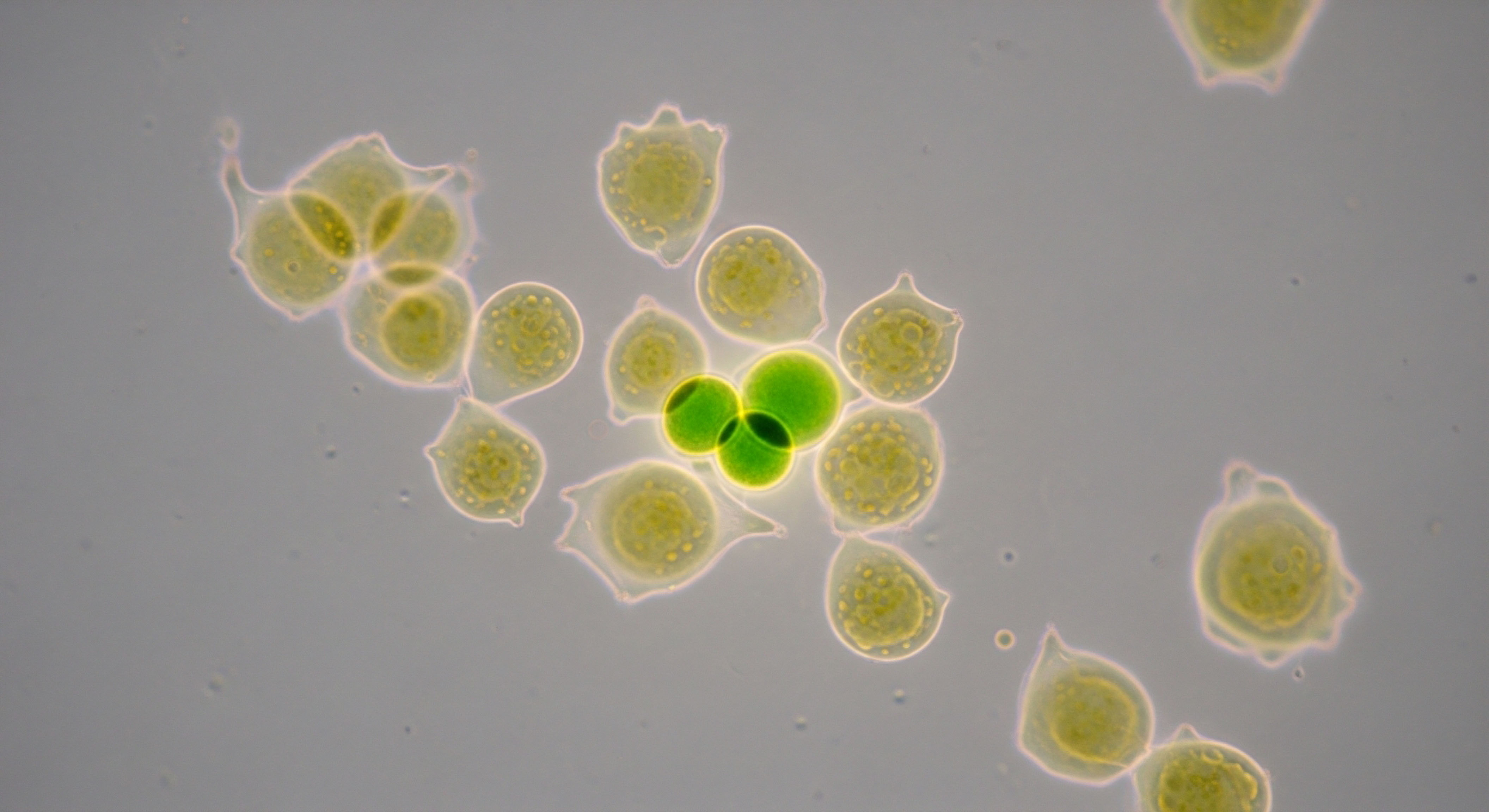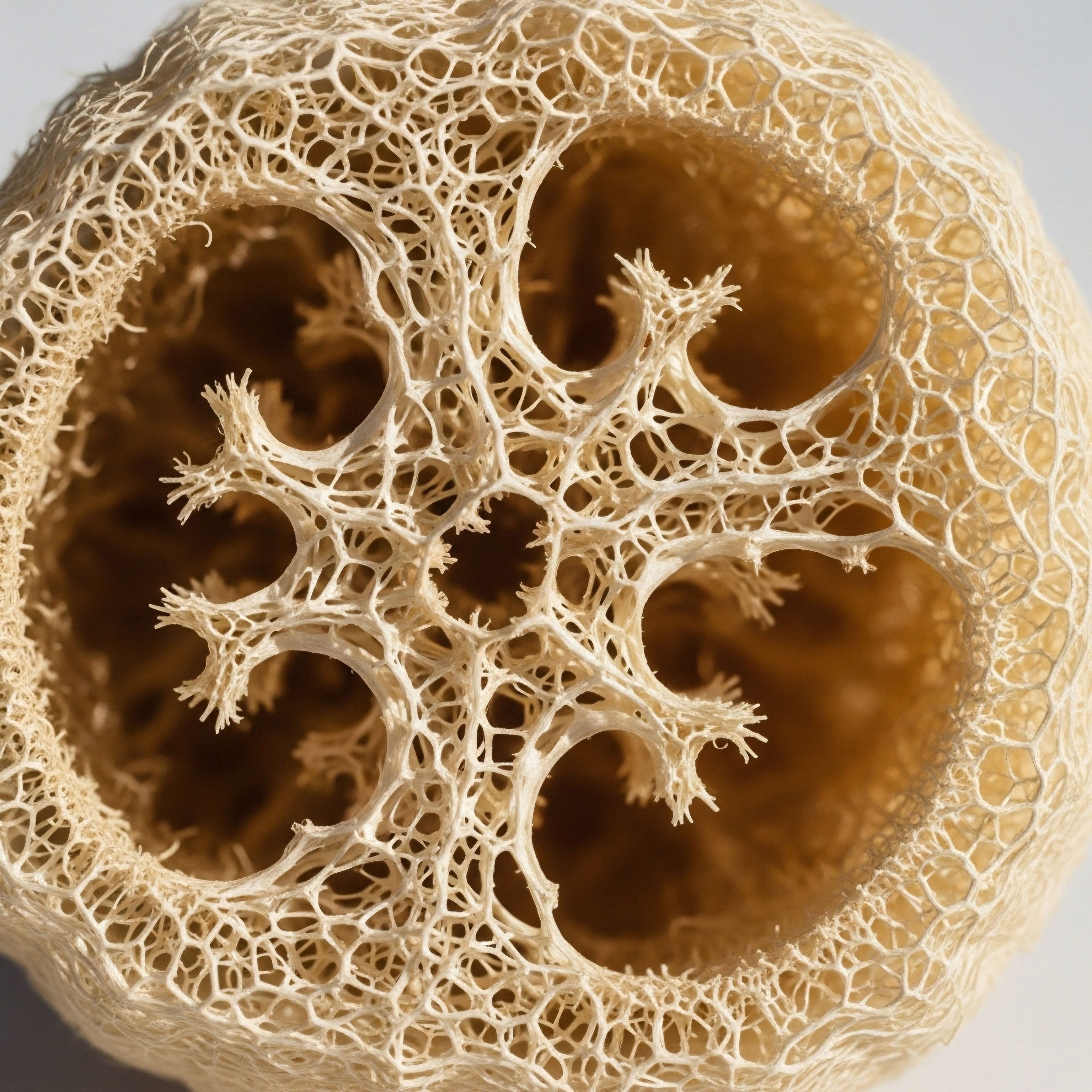

Fundamentals
Perhaps you have noticed a subtle shift in your mental landscape. A moment of hesitation when recalling a name, a slight cloudiness that obscures once-sharp thoughts, or a diminished capacity to maintain focus on tasks that previously held your complete attention.
These experiences, often dismissed as inevitable aspects of aging or daily stress, can feel disorienting, even isolating. They hint at a deeper imbalance within your biological systems, signaling that the intricate network governing your vitality may require recalibration. Understanding these changes, not as personal failings, but as expressions of your body’s current state, represents the first step toward reclaiming your cognitive edge.
Our bodies operate as complex, interconnected systems, much like a sophisticated orchestra where each instrument must play in harmony for a beautiful composition to emerge. Hormones serve as the conductors of this internal symphony, sending precise messages that regulate virtually every physiological process.
Among these vital chemical messengers, testosterone plays a far more expansive role than its common association with muscle mass or reproductive health suggests. This steroid hormone exerts significant influence over brain function, directly impacting cognitive acuity, mood regulation, and overall mental resilience.
Cognitive shifts, such as memory lapses or reduced focus, often signal underlying hormonal imbalances that warrant careful consideration.

What Are Hormones and How Do They Work?
Hormones are signaling molecules produced by endocrine glands, traveling through the bloodstream to target cells and tissues throughout the body. They bind to specific receptors on these cells, initiating a cascade of events that alter cellular activity. This intricate communication network, known as the endocrine system, orchestrates everything from metabolism and growth to mood and cognitive processes.
Testosterone, for instance, is synthesized primarily in the testes in men and in the ovaries and adrenal glands in women, circulating to influence a wide array of physiological functions.
The brain, far from being an isolated command center, is a highly responsive target for hormonal signals. Specific regions of the brain, including the hippocampus, a structure central to memory formation, and the prefrontal cortex, responsible for executive functions, possess abundant receptors for various hormones, including testosterone. This direct interaction means that fluctuations in hormonal levels can directly translate into observable changes in mental performance and emotional well-being.

Testosterone’s Role beyond Muscle and Libido
While widely recognized for its influence on physical attributes and sexual drive, testosterone’s contributions to cognitive health are equally compelling. Research indicates that optimal testosterone levels support various neurological processes essential for sharp thinking and mental clarity.
These include safeguarding neural cells from damage, enhancing the brain’s capacity to adapt and form new connections, and ensuring neurons have sufficient energy to operate efficiently. A decline in this hormone, whether due to aging or other factors, can therefore manifest as cognitive symptoms that affect daily living.


Intermediate
When the delicate balance of the endocrine system is disrupted, particularly concerning testosterone, the effects can ripple throughout the body, impacting cognitive function. Addressing these imbalances requires a precise, evidence-based approach, often involving targeted hormonal optimization protocols. These interventions aim to restore physiological levels of hormones, thereby supporting the body’s innate capacity for self-regulation and vitality.

Testosterone Replacement Therapy for Men
For men experiencing symptoms associated with diminished testosterone, such as reduced mental acuity, fatigue, or mood changes, Testosterone Replacement Therapy (TRT) offers a structured pathway to restoration. A common protocol involves weekly intramuscular injections of Testosterone Cypionate (200mg/ml). This method ensures consistent delivery of the hormone, allowing for stable blood levels. However, simply replacing testosterone is often insufficient for comprehensive hormonal balance.
To maintain natural testosterone production and preserve fertility, Gonadorelin is frequently incorporated into the protocol, administered via subcutaneous injections twice weekly. This peptide stimulates the body’s own production of luteinizing hormone (LH) and follicle-stimulating hormone (FSH), which are crucial for testicular function. Another vital component is Anastrozole, an oral tablet taken twice weekly.
Anastrozole acts as an aromatase inhibitor, preventing the conversion of excess testosterone into estrogen, thereby mitigating potential side effects such as fluid retention or gynecomastia. In some cases, Enclomiphene may be included to specifically support LH and FSH levels, particularly when fertility preservation is a primary concern.
Tailored testosterone replacement protocols for men often combine testosterone with agents that preserve natural production and manage estrogen levels.

Testosterone Replacement Therapy for Women
Testosterone’s role in women’s health, while requiring lower dosages, is equally significant for cognitive function, mood, and overall well-being. Women, particularly those in pre-menopausal, peri-menopausal, or post-menopausal stages, can experience cognitive symptoms like brain fog or memory issues due to declining testosterone levels.
Protocols for women typically involve lower doses of Testosterone Cypionate, often 10 ∞ 20 units (0.1 ∞ 0.2ml) weekly via subcutaneous injection. This precise dosing helps achieve therapeutic levels without inducing unwanted androgenic side effects. Progesterone is prescribed based on menopausal status, playing a crucial role in hormonal harmony and often complementing testosterone’s effects on mood and sleep. For sustained release, Pellet Therapy, involving long-acting testosterone pellets inserted subcutaneously, may be an option, with Anastrozole considered when appropriate to manage estrogen conversion.

How Do Peptides Support Cognitive Function?
Beyond traditional hormone replacement, targeted peptide therapies offer additional avenues for supporting cognitive acuity and overall vitality. These specialized protein fragments interact with specific receptors to stimulate natural physiological processes.
Growth Hormone Peptide Therapy is a prominent example, often sought by active adults and athletes for its anti-aging properties, muscle gain, fat loss, and sleep improvement. Key peptides in this category include ∞
- Sermorelin ∞ A growth hormone-releasing hormone (GHRH) analog that stimulates the pituitary gland to produce and secrete its own growth hormone.
- Ipamorelin / CJC-1295 ∞ These peptides also act as growth hormone secretagogues, promoting a more natural, pulsatile release of growth hormone.
- Tesamorelin ∞ A GHRH analog specifically approved for reducing excess abdominal fat, which can indirectly support metabolic and cognitive health.
- Hexarelin ∞ Another potent growth hormone-releasing peptide with potential benefits for tissue repair and cognitive support.
- MK-677 ∞ An oral growth hormone secretagogue that can increase growth hormone and IGF-1 levels.
These peptides can enhance cognitive function by promoting neuroprotection, supporting neurogenesis, and improving overall brain metabolism.

Other Targeted Peptides for Well-Being
Specific peptides address distinct aspects of health that can indirectly influence cognitive performance ∞
- PT-141 ∞ Primarily used for sexual health, addressing libido and arousal, which are often intertwined with overall well-being and mental state.
- Pentadeca Arginate (PDA) ∞ A peptide known for its roles in tissue repair, accelerating healing processes, and modulating inflammation, all of which contribute to systemic health and can indirectly support brain function.
The selection and application of these protocols are highly individualized, guided by comprehensive lab assessments and a deep understanding of each person’s unique biological landscape.
| Protocol Type | Primary Agent | Supporting Agents | Targeted Benefits (Cognitive & Beyond) |
|---|---|---|---|
| Testosterone Replacement (Men) | Testosterone Cypionate (IM) | Gonadorelin (SC), Anastrozole (Oral), Enclomiphene (Oral) | Improved memory, executive function, mood, energy, muscle mass, bone density. |
| Testosterone Replacement (Women) | Testosterone Cypionate (SC) or Pellets | Progesterone (Oral/Topical), Anastrozole (Oral, if needed) | Enhanced focus, memory, mental clarity, libido, mood, energy. |
| Growth Hormone Peptide Therapy | Sermorelin, Ipamorelin/CJC-1295, Tesamorelin, Hexarelin, MK-677 | N/A | Improved memory, attention, executive function, sleep quality, body composition. |


Academic
The influence of testosterone on cognitive acuity extends far beyond simple presence or absence; it involves intricate molecular signaling pathways and a dynamic interplay with other biological systems. To truly appreciate how testosterone shapes our mental landscape, we must delve into the cellular and systemic mechanisms that underpin its effects.

How Does Testosterone Interact with Brain Cells?
Testosterone exerts its effects in the brain through several sophisticated mechanisms. Primarily, it acts via androgen receptors (ARs), which are widely distributed throughout various brain regions critical for cognitive function, including the hippocampus, prefrontal cortex, and amygdala. When testosterone, or its more potent metabolite dihydrotestosterone (DHT), binds to these receptors, it initiates a cascade of genomic effects.
This involves the hormone-receptor complex translocating to the cell nucleus, where it modulates gene expression, leading to the synthesis of specific proteins that influence neuronal growth, differentiation, and survival.
Beyond these genomic actions, testosterone also engages in rapid, non-genomic signaling. These effects occur quickly, often within seconds or minutes, by interacting with receptors on the cell membrane or within the cytoplasm, triggering immediate changes in cellular activity, such as ion channel modulation or activation of intracellular signaling cascades. This dual mode of action allows testosterone to exert both long-term structural and short-term functional changes within neural networks.
Testosterone influences brain function through both direct receptor binding that alters gene expression and rapid signaling pathways.

Testosterone’s Role in Neurogenesis and Neuroprotection
A significant area of research focuses on testosterone’s impact on adult neurogenesis, the process by which new neurons are generated in the adult brain. Studies consistently show that testosterone enhances the survival of newly formed neurons, particularly within the dentate gyrus of the hippocampus, a region vital for learning and memory. While testosterone appears to primarily influence neuron survival rather than proliferation, this effect is crucial for maintaining neural plasticity and cognitive resilience.
Moreover, testosterone demonstrates robust neuroprotective properties. It helps shield brain cells from oxidative stress and inflammation, two major contributors to neurodegenerative processes. By reducing the accumulation of harmful substances, such as amyloid-beta plaques, which are characteristic of Alzheimer’s disease, testosterone contributes to preserving neuronal integrity and function. This protective capacity underscores its broader role in maintaining long-term brain health.

The Interconnectedness of Endocrine Axes and Cognition
Cognitive function is not solely dependent on testosterone; it is a product of the intricate balance within the entire endocrine system. The Hypothalamic-Pituitary-Gonadal (HPG) axis, which regulates testosterone production, is itself influenced by and influences other major endocrine axes, such as the hypothalamic-pituitary-adrenal (HPA) axis (stress response) and the hypothalamic-pituitary-thyroid (HPT) axis (metabolism).
Dysregulation within the HPG axis, whether due to aging, chronic stress, or other factors, can lead to a cascade of effects that compromise cognitive performance. For instance, age-related declines in testosterone are often accompanied by changes in other hormones and neurotransmitters, creating a complex web of interactions that can affect memory, attention, and executive function. Understanding these systemic interdependencies is paramount for developing comprehensive wellness protocols.
| Mechanism | Description | Cognitive Impact |
|---|---|---|
| Androgen Receptor Activation | Testosterone and DHT bind to ARs in brain regions like the hippocampus, modulating gene expression for neuronal health. | Supports neuronal growth, differentiation, and survival, influencing memory and executive function. |
| Neurogenesis Enhancement | Increases the survival of new neurons in the dentate gyrus of the hippocampus. | Promotes neural plasticity, learning, and memory formation. |
| Neuroprotection | Reduces oxidative stress, inflammation, and amyloid-beta accumulation in brain tissue. | Protects neurons from damage, potentially reducing risk of neurodegenerative conditions. |
| Neurotransmitter Modulation | Influences the synthesis and activity of neurotransmitters like dopamine and serotonin. | Affects mood, motivation, attention, and overall cognitive processing. |

Can Optimizing Testosterone Prevent Cognitive Decline?
The question of whether optimizing testosterone can prevent or reverse cognitive decline is a subject of ongoing clinical investigation. While observational studies show associations between lower testosterone levels and increased risk of cognitive impairment, randomized controlled trials offer mixed but promising results. Many studies indicate that testosterone supplementation can improve specific cognitive domains, such as spatial and verbal memory, and executive function, particularly in individuals with existing low testosterone levels or mild cognitive impairment.
The effectiveness of such interventions often depends on factors like the individual’s baseline hormone status, the specific cognitive domains assessed, and the duration and dosage of the intervention. A personalized approach, guided by thorough diagnostic testing and clinical expertise, is essential to determine the appropriate course of action and to monitor outcomes effectively. The goal remains to restore physiological balance, thereby supporting the brain’s capacity for optimal function throughout life.

References
- Cherrier, M. M. et al. “Testosterone supplementation improves spatial and verbal memory in healthy older men.” Neurology, vol. 60, no. 10, 2003, pp. 1749-1754.
- Moffat, S. D. et al. “Testosterone and cognitive function ∞ current clinical evidence of a relationship.” European Journal of Endocrinology, vol. 155, no. 6, 2006, pp. 773-781.
- Spritzer, M. D. and Roy, E. A. “Testosterone and Adult Neurogenesis.” Cells, vol. 9, no. 2, 2020, p. 353.
- Zarrouf, F. A. et al. “Testosterone and brain aging.” MedCrave Online Journal of Gerontology & Geriatric Research, vol. 11, no. 1, 2025, pp. 1-10.
- Durdiakova, J. et al. “Testosterone and its metabolites ∞ modulators of brain functions.” Physiological Research, vol. 61, no. 5, 2012, pp. 435-447.
- Hogervorst, E. et al. “Testosterone and cognition in older men ∞ a systematic review.” Journal of Clinical Endocrinology & Metabolism, vol. 95, no. 10, 2010, pp. 4480-4491.
- Alexander, G. M. et al. “Androgens and Adult Neurogenesis in the Hippocampus.” Hormones and Behavior, vol. 136, 2022, p. 105054.
- Bimonte-Nelson, H. A. et al. “Role of Androgens and the Androgen Receptor in Remodeling of Spine Synapses in Limbic Brain Areas.” Journal of Neuroscience Research, vol. 85, no. 13, 2007, pp. 2881-2891.
- Snyder, P. J. et al. “Effects of Testosterone Treatment on Cognitive Function in Older Men With Low Testosterone Levels ∞ A Randomized Controlled Trial.” JAMA Internal Medicine, vol. 178, no. 7, 2018, pp. 896-905.
- Resnick, S. M. et al. “Testosterone treatment and cognitive function in older men ∞ a systematic review.” Journal of Clinical Endocrinology & Metabolism, vol. 95, no. 10, 2010, pp. 4480-4491.

Reflection
As you consider the intricate connections between testosterone and cognitive acuity, perhaps a sense of agency begins to settle within you. The insights shared here are not merely academic points; they are guideposts for your personal health journey. Recognizing the profound influence of hormonal balance on your mental sharpness and overall vitality is a powerful realization.
This understanding invites you to look inward, to listen to the subtle signals your body sends, and to consider how a deeper engagement with your biological systems might unlock a renewed sense of well-being.
Your path toward optimal health is unique, reflecting your individual physiology and lived experiences. The knowledge that specific, evidence-based protocols exist to support hormonal equilibrium can serve as a catalyst for proactive engagement with your health. This journey is about restoring harmony within your internal systems, allowing you to function with clarity, energy, and purpose. It is a testament to the body’s remarkable capacity for healing and adaptation when provided with precise, personalized support.



